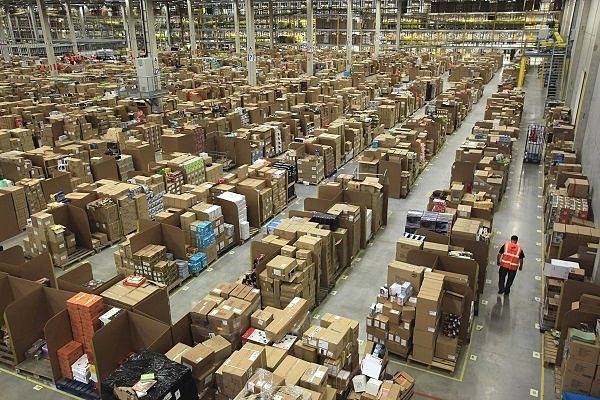News Brief
Amazon And Tata Claims Center's E-Commerce Regulations Will Harm Their Businesses
- The government's strict e-commerce rules that are aimed at improving consumer protection have alarmed the country's online retailers.
- Amazon and Tata Group said that tougher e-commerce rules would significantly impact their business models.

Warehouse for an e-commerce firm. (representative image) (Matt Cardy/Getty Images)
The American retail behemoth Amazon and India's Tata Group told the centre that plans for tougher rules for online retailers would have a significant impact on their business models. According to people familiar with the discussion, on 3 July, many executives expressed concerns and confusion about the proposed rules at a meeting organised by the Ministry of Consumer Affairs, as well as the government's investment promotion arm, Invest India and asked that the 6 July deadline for submitting comments be extended.
The Consumer Protection (e-commerce) Rules, 2020, which were announced on 21 June, will be enacted when industry input is considered. The guidelines are expected to tighten e-commerce laws, such as prohibiting related organisations from selling on platforms and limiting flash sales. The e-commerce behemoths are already prohibited from owning or managing businesses that sell on their platform, from engaging in exclusive agreements with businesses for online sales of products like cellphones, as well as from undercutting goods.
The government's strict e-commerce rules are aimed at improving consumer protection, have alarmed the country's online retailers, more specifically market leaders Amazon and Walmart-owned Flipkart. However, as reported by Reuters, these new rules may not only force global players to reconsider their business structures, but they may also raise costs for domestic competitors such as Reliance Industries' JioMart, BigBasket and Snapdeal. As per the report, some unnamed sources said that Amazon said the coronavirus pandemic had already impacted small businesses and the proposed rules will have a notable impact on its sellers, arguing that some clauses were already covered by existing legislation.
According to the proposed guideline, e-commerce companies must verify that none of their affiliated businesses is featured as merchants on their platforms. A representative of Tata Sons—India's $100 billion Tata Group's holding company—claimed that the proposed condition was problematic, citing an example in which it would prevent Starbucks, which has a joint venture with Tata in India, from offering its items on Tata's marketplace website. As per two sources, the Tata executive stated that the restrictions will have broad implications for the group and may restrict sales of its private brands. Meanwhile, a Reliance official said that the regulation would increase consumer confidence, but several clauses need to be clarified. However, on 2 July, Commerce and Industry Minister Piyush Goyal clarified that "we [the ministry] are not changing any policy on e-commerce for FDI. The policy is crystal clear ever since it was first opened up, but certain instances have come to our notice, where the policy is not being followed in letter and spirit. We will obviously be clarifying that very shortly".
Additionally, the Reuters report said that according to the sources, a consumer ministry official argued that the laws were designed to safeguard consumers and were less stringent than those in other nations. Anupam Mishra, the Consumer Affairs Ministry's Joint Secretary, stated that other countries governments are more demanding when it comes to the rules that apply to their jurisdictions and that corporations should look at those before raising complaints about the standards in India, according to Moneycontrol.
Introducing ElectionsHQ + 50 Ground Reports Project
The 2024 elections might seem easy to guess, but there are some important questions that shouldn't be missed.
Do freebies still sway voters? Do people prioritise infrastructure when voting? How will Punjab vote?
The answers to these questions provide great insights into where we, as a country, are headed in the years to come.
Swarajya is starting a project with an aim to do 50 solid ground stories and a smart commentary service on WhatsApp, a one-of-a-kind. We'd love your support during this election season.
Click below to contribute.
Latest